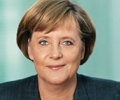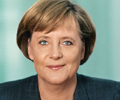

As Germany prepares for an overhaul in its political status quo, analysts are looking at what impact the next government could have on the European Union.
Europe’s biggest economy headed to the polls on Sunday in a pivotal vote to choose a new chancellor, after Angela Merkel’s 16 years in power.
The Socialist Party, SPD, narrowly won the election, according to preliminary results, with 25.7% of support. It is now trying to form a coalition government with the Green party and the liberal FDP. Merkel’s conservative alliance of the Christian Democratic Union and Christian Social Union, which has dominated German politics for decades, suffered its worst election result since World War II, receiving 24.1% of the vote.
The SPD’s candidate for chancellor Olaf Scholz, the country’s current finance minister and vice chancellor, now looks to be in pole position to be the next German leader. Although it’s not a done deal and tough coalition talks could ultimately fail.
“If Olaf Scholz becomes chancellor, he will be quite well-positioned, because he at least has the experience of a finance minister,” Daniela Schwarzer, executive director at Open Society Foundations, told CNBC Monday about Scholz’s relationship with Europe.
Despite this, Schwarzer noted that Scholz remains far less experienced than Merkel, who has played a fundamental role in European politics for years.
“We may see a few months in particular — also given the French election coming up next spring — where things may be less smooth than they usually would be,” she added.
Germany, as one of the founding nations of the EU, has long held a certain weight in European policymaking. During her time as chancellor, Merkel helped lead the bloc’s response to the global financial crisis, sovereign debt crisis, migration crisis, and more recently, the coronavirus pandemic.
Beyond leadership style, there are open questions about what the new German chancellor will mean for deeper integration among the 19 euro economies.
“While the mood music is going to be a bit more positive towards some of the things that the EU wants, I think the ability of the German chancellor to act decisively — that’s going to be pretty constrained,” Robin Bew, managing director at the Economist Intelligence Unit, told CNBC’s “Squawk Box Europe” on Monday.
That’s because the coalition, once formed, will likely lean a little more toward EU integration than in the past. However, he stressed that a three-way coalition will also be harder to manage, given the wider range of opinions.
“I don’t think you will see particularly strong leadership,” Bew added.
European issues
The next German government will have to grapple with many issues in Europe.
One of the main projects at the euro zone level is completing the so-called Banking Union — which transfers powers from national banking authorities to European-wide institutions. It has been introduced slowly in the wake of the debt crisis, but Germany has been particularly reticent to the idea. Many Germans are opposed to the project, fearing that they could be forced to pay heavy bills to support less-financially conservative euro nations.
The euro zone is also due to update its debt and fiscal rules in 2022 because the rules have been broken on several occasions, with various nations reporting a debt ratio above 60% of GDP, for instance. Deviations are expected to continue.
It is unclear whether Germany, which is known for its support of a tight fiscal policy across the bloc, will back changes to the debt ceiling in particular.
In addition, the EU took the decision in July 2020 to raise money jointly from public markets to fund the region’s recovery from the pandemic. The so-called Recovery Fund was pitched as a one-off measure to appease fiscally conservative nations, such as the Netherlands, but some experts wonder whether the EU could make it a permanent tool — something that would require the backing of the new German chancellor.
The SPD’s Scholz has argued that Europe’s fiscal rules are flexible enough already, in that they allowed countries to spend more when the pandemic hit. He has also dodged questions about raising EU debt again the future, saying that’s not a debate on the table.
Meanwhile, the FDP, which is likely to feature in the next German coalition, has “turned rather Eurosceptic in terms of deeper euro zone integration,” analysts at the consultancy firm Eurasia said in a note Monday.
“A dramatic softening of the German stance on EU’s debt and fiscal rules is therefore unlikely, so is making the Recovery Fund a permanent feature of EU’s fiscal architecture.”
Another issue in Europe is its ambitious attempts to become carbon neutral by 2050. In order to achieve this, a concrete plan to reduce greenhouse gas emissions by at least 55% by 2030 is being discussed by European lawmakers. Germany, with its prominent auto sector, will have a key role to play here if the green ambitions are to be met.
Eurasia described the SPD’s Scholz as a pragmatist on this front, saying he will be “open to using wriggle room to help finance Germany’s transition to net-zero.”
European Parliament President David Sassoli has been one of the few politicians in Europe to comment on the result of the vote. After congratulating Scholz on his win, he said: “After this historic crisis, there is no time to lose: Europe needs a strong and reliable partner in Berlin to continue our common work for a social and green recovery.”
Source: CNBC